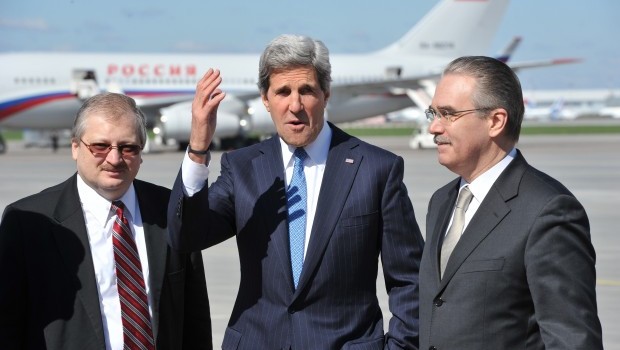
US secretary of state John Kerry, center, gestures next to Yuri Filatov, right, of the Russian Foreign Ministry and Alexandr Darchiyev of the Russian Foreign Ministry North American Department after Kerry’s arrival at Moscow Vnukovo Airport on Tuesday, May 7, 2013. (AP Photo/ Mladen Antonov, pool)
A State Department official said yesterday that the US intended to use the meeting to make another attempt to enlist Russian help in finding a political solution to the civil war in Syria, which has so far killed more than 70,000 people.
Speaking to reporters in Washington, the official said that while both the US and Russia were formally committed to a solution based on the Geneva Communiqué, which outlines the need for a political solution based on dialogue, to date this has not led to any meaningful cooperation between the two states.
The spokesperson said: “We certainly want to try to make another stab at it, to make another effort at it, because events on the ground have become steadily worse. The casualty figures are mounting, the rate of killing has gone up, and, as the Israeli strikes show, the situation is adding to instability in the region.”
So far, Russia had generally resisted attempts to put international pressure on the government of Bashar Al-Assad.
Earlier this week, the Russia foreign ministry expressed concern that the chances of foreign intervention in the conflict are growing in the wake of the latest round of Israeli air strikes at targets close to Damascus and the accusations of the use of chemical weapons by the Syrian government and opposition.
A Russian foreign ministry spokesman, Alexander Lukashevich, said in a statement yesterday: “We are seriously concerned by the signs of preparation of global public opinion for possible armed intervention in the long-running internal conflict in Syria.”
“The internationalization of the extremely dangerous and destructive internal conflict in Syria must not be permitted, he added, calling for “decisive efforts aimed at shifting the events in Syria into a peaceful channel.”
The Israeli strikes on Syrian territory, which took place on Friday and Sunday, were reportedly aimed at destroying weapons en route to Hezbollah in Lebanon.
Confusion about the growing number of reports on the use of chemical weapons in Syria continued this week, with Western governments and the UN insisting that they had no concrete evidence of the use of nerve agents by the government, while expressing scepticism about evidence of its deployment by rebel forces.
This followed a statement on Sunday by Carla del Ponte, a member of the UN panel investigating claims that chemical weapons have been used in Syria, that there were “strong, concrete suspicions” that rebels had used poison gas.
However, UN investigators said on Monday that there was no conclusive proof, stating: “The Independent International Commission of Inquiry on the Syrian Arab Republic wishes to clarify that it has not reached conclusive findings as to the use of chemical weapons in Syria by any parties to the conflict.”
The White House also dismissed the claims, saying that it was more likely that the Syrian government was responsible, but that hard evidence was needed by before reaching any judgement on the issue.
The Obama administration is facing mounting pressure in Congress to act on reports of chemical weapons use in Syria, which the president has previously described as a “red line” and a “game changer.”
The chairman of the Senate’s Foreign Relations Committee, Democrat Robert Menendez, introduced a bill that would allow the US to provide weapons, military training and non-lethal aid to some groups of Syrian rebels yesterday.
“The Assad regime has crossed a red line that forces us to consider all options,” Menendez said in a statement. “The greatest humanitarian crisis in the world is unfolding in and around Syria, and the US must play a role in tipping the scales toward opposition groups and working to build a free Syria.”
Menendez’s legislation would also create a USD 250 million transition fund to help the civilian opposition in providing services and impose sanctions on arms and oil sales to Assad’s government.
In response to concerns that the weapons could fall into the hands of terrorists, the senator said that the weapons would be sent to rebel groups that had gone through a vetting process and met standards on human rights, terrorism and non-proliferation.
